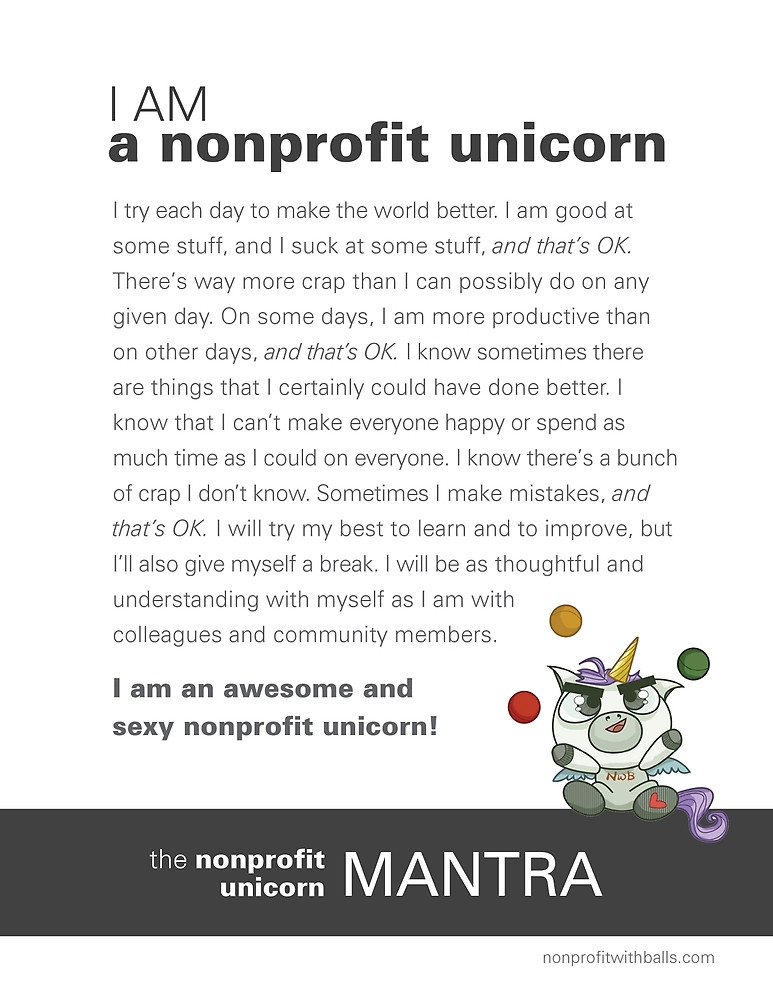In Search of the Unicorn
0 comment
I sent Vu Le’s “welcome back” blog to all of the executive directors and board presidents in the various peer learning groups that I facilitate. After I wrote last week about the importance of celebrations, his blog was a great follow up, while pointing out the mistake of failing to celebrate oneself. Yet I have to observe that for some, celebrating self may come too readily.

This fear was well fed this weekend, while my faith in the ability for our sector to continue to have great work done in the future was badly shaken. My sister, who teaches fifth grade in an urban public school with a very diverse population (by race, socioeconomic status, family configurations, parental ages, jobs, countries of origin, etc.) was visiting me. Teaching is her second career, having spent years working on Capitol Hill. Now, in her 17th year, she will retire in June. I will miss gaining a window into the minds of tomorrow’s adults, as foretold by 10 and 11-year-old.
Talking about her current classroom lessons, one story she told has me totally frightened for society in general and for our sector, in particular. The story involves a writing assignment that followed the reading of a Pink and Say, by Patricia Polacco, whose description had me fighting back tears. The students’ assignment was to write about a time in their lives when they were selfless.
She had to do some explaining about what it meant to be selfless, adding that selflessness generally involves some degree of sacrifice. (Note: just like philanthropy). She gave examples from her own life and then asked her students to think of examples of their own. This required a lot of thought and clearly, the students struggled with it. One finally told of the time his mother had given him five dollars to shop for some items. The student described leaving the store when a homeless man asked for money. He took the $.76 he had in change and gave it to the man. My sister asked him where was his sacrifice? He was silent. With some more prodding and coaxing, about half the class found examples. They were told to go home and talk with their parents/guardians. I await an update—but not with much hope.
Another classroom that had the same assignment. That teacher, too, talked with the kids, gave examples, coaxed and prodded. Not one student could come up with an example of when s/he acted selflessly. Not one! One boy pushed back and asked why it mattered; he saw no reason to be or value in being selfless.
Why does this worry me? According to the stages of moral development in children, those between the ages of three and five have developed an understanding of right and wrong and by five have internalized their family’s values. By 10, children generally have a clear understanding of should and should not, and then test this understanding as they move into the pre-teen and teen years.
So, here is the rub, so evident in the fifth graders at my sister’s school. By 10, kids have started questioning authority—parents, teachers, any adult. In fact, the boy who questions why selflessness matters regularly talks back and challenges his younger, less experienced reading teacher, though would likely never do so to my sister. Moreover, as children move to their pre-teen and teenage years, it is their peers, as we know, who more often have greater sway with them than their parents do. Back to the rub: the lack of value of selflessness was learned in this boy’s family; an entire class where not one student could think of a selfless deed they had done learned the lesson that selflessness was not important from their parents/guardians. Add to this that the clueless boy is the alpha male in a pack of four boys who tease girls about their body parts and sing songs glorifying AK47s. Now do you understand my fears?
Perhaps the scariest part about this story, and why this worries me for the future of our sector, is that nothing here is new; it is only more extreme than ever before. There have been and always will be plenty of people who can’t understand why anyone would be selfless, why anyone would want to work in the nonprofit sector (as opposed to those poor sods who simply end up there because they aren’t qualified to do anything else), why anyone would earn less money simply so they can make the world a better place. But when an entire class of 24 fifth graders cannot identify one selfless act that any one of them had done, well, draw your own conclusions. And think about the future.
The opinions expressed in Nonprofit University Blog are those of writer and do not necessarily reflect the opinion of La Salle University or any other institution or individual.
